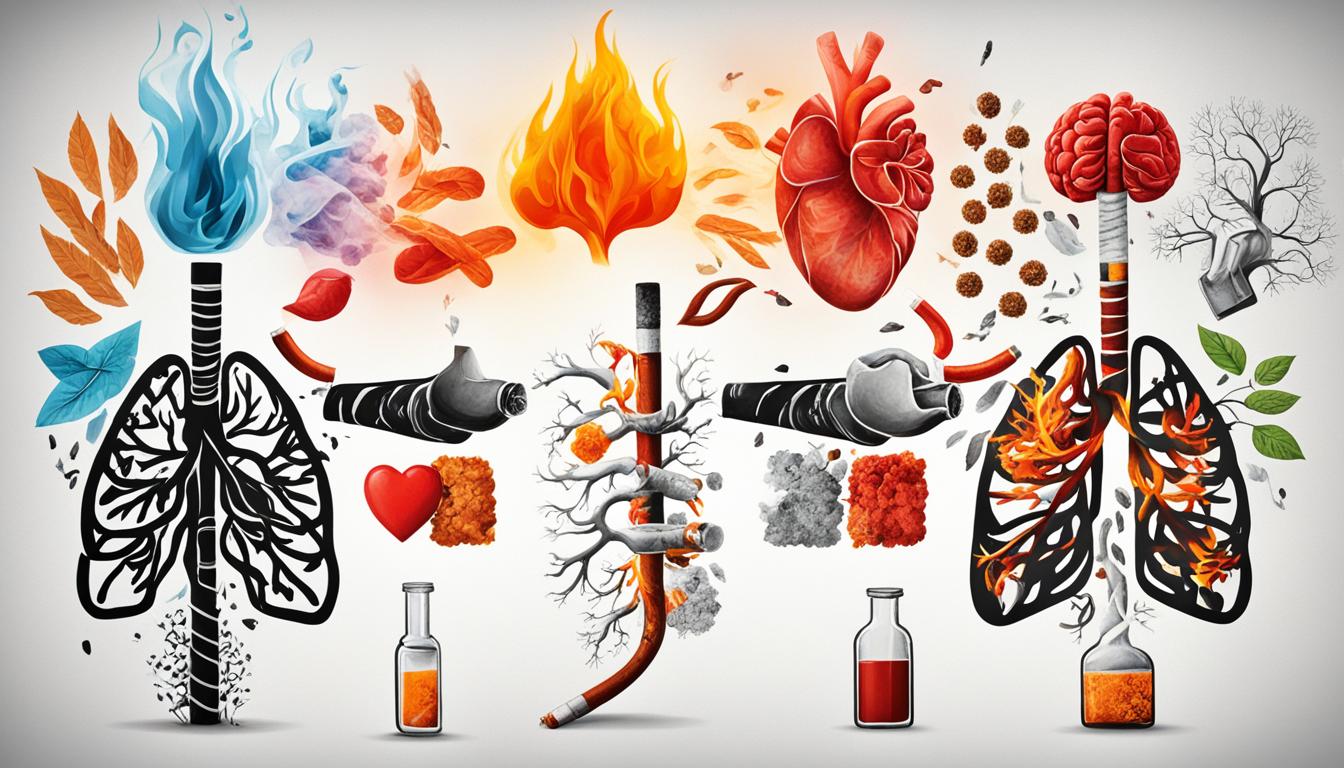Smoking is a dangerous habit that poses significant risks to overall health. It affects vital organs, increases the likelihood of chronic diseases, and greatly diminishes the quality of life for individuals who engage in this harmful behavior.
When it comes to the impact of smoking on overall health, no organ is spared. From the lungs to the heart and brain, smoking wreaks havoc on these vital parts of the body, leading to a wide range of health problems.
For instance, smoking is a leading cause of respiratory conditions such as chronic bronchitis and emphysema. These diseases greatly compromise lung function and can significantly reduce overall quality of life. Additionally, smoking is heavily linked to cardiovascular diseases, including heart attacks and strokes. The chemicals present in tobacco smoke can damage blood vessels, restrict blood flow, and increase the risk of such life-threatening conditions.
Moreover, the harmful effects of smoking extend to the brain. Studies have shown that smokers have a higher risk of cognitive decline and dementia. The toxins in cigarettes can adversely affect brain cells and increase the likelihood of developing these debilitating conditions.
In addition to impacting vital organs, smoking is also strongly associated with the development of chronic diseases. Lung cancer, in particular, is highly prevalent among smokers. The carcinogens in tobacco smoke can cause DNA mutations and lead to the growth of cancer cells in the lungs. Smoking is also a significant risk factor for other types of cancer, including those affecting the throat, mouth, and esophagus.
Furthermore, smokers face an elevated risk of chronic conditions such as heart disease, diabetes, and respiratory illnesses. The harmful chemicals in cigarette smoke can damage the cardiovascular system, disrupt metabolic processes, and weaken the respiratory system, making smokers more susceptible to developing these long-term health issues.
Overall, smoking poses a significant threat to overall health. From its detrimental effects on vital organs to its association with chronic diseases, quitting smoking is crucial for individuals to minimize their risk and improve their quality of life.
Smoking and its Effects on Vital Organs
Smoking has devastating effects on vital organs, wreaking havoc on the lungs, heart, and brain. The detrimental impact of smoking on these crucial organs cannot be ignored.
The Lungs: Smoking greatly increases the risk of respiratory conditions such as chronic bronchitis and emphysema. The toxic chemicals in tobacco smoke cause inflammation and damage to the delicate lung tissues, leading to shortness of breath, coughing, and an increased susceptibility to infections.
The Heart: The link between smoking and cardiovascular diseases is well-established. Smoking damages the blood vessels, causing them to narrow and harden (atherosclerosis). This restricts blood flow to the heart, leading to an increased risk of heart attacks and strokes. The chemicals in cigarettes also contribute to an unhealthy balance of cholesterol, further exacerbating cardiovascular issues.
The Brain: Smoking isn’t just harmful to the lungs and heart; it also poses a serious risk to brain health. Research suggests that smoking increases the likelihood of developing brain-related disorders, including dementia and cognitive decline. The chemicals in tobacco smoke contribute to the build-up of harmful plaques in the brain, impairing cognitive function over time.
The impacts of smoking on these vital organs are severe and can have long-lasting consequences. Quitting smoking is crucial to protect the lungs, heart, and brain, and mitigate the risk of developing life-threatening conditions.
Smoking and the Development of Chronic Diseases
Smoking is a leading cause of chronic diseases that have a severe impact on individuals’ health and well-being. One of the most significant risks associated with smoking is the development of various types of cancer, with lung cancer being the most prominent. Studies have consistently shown a strong link between smoking and lung cancer, making it crucial for smokers to understand the dangers and take action to quit.
In addition to lung cancer, smoking is also closely connected to other forms of cancer, including those affecting the throat, mouth, and esophagus. The harmful chemicals present in tobacco smoke can cause significant damage to these areas, increasing the likelihood of developing cancerous cells. It is essential to raise awareness about these risks and encourage individuals to seek support in quitting smoking in order to reduce their chances of developing these life-threatening diseases.
Furthermore, smoking has been found to be a contributing factor in the development of chronic conditions such as heart disease, diabetes, and respiratory illnesses. The toxic substances in cigarette smoke can damage the lining of blood vessels, leading to the narrowing and hardening of arteries, which can result in heart attacks and strokes. Smoking also compromises the body’s ability to regulate insulin, increasing the risk of developing diabetes. Additionally, the inhalation of smoke irritates and damages the respiratory system, making smokers more susceptible to conditions like chronic bronchitis and emphysema.
Given the profound impact smoking has on the development of chronic diseases, it is paramount for individuals to make every effort to quit smoking. By ceasing this harmful habit, individuals can significantly reduce their risk of cancer, heart disease, diabetes, respiratory illnesses, and other chronic conditions. Quitting smoking may not be easy, but with the right support and resources, individuals can take control of their health and pave the way for a healthier, smoke-free future.






